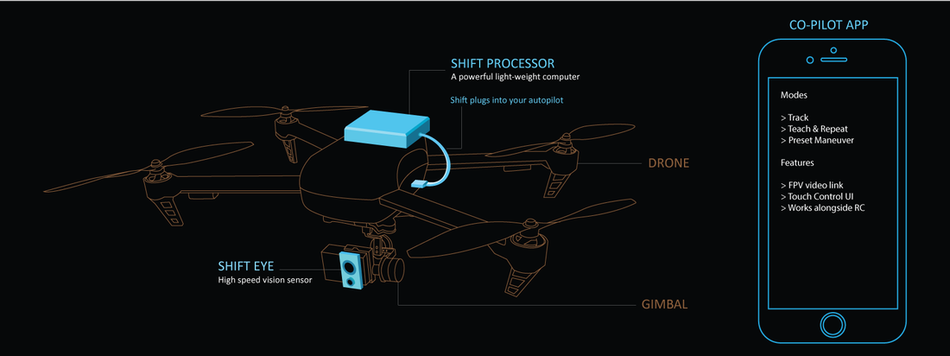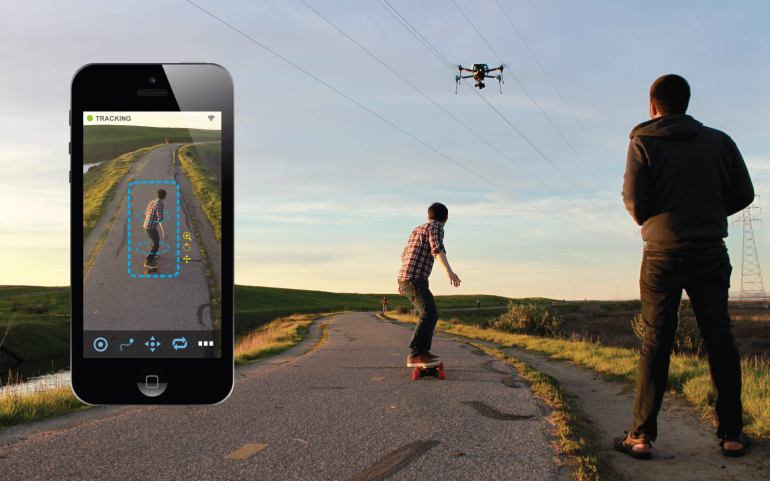If drones are going to take to the skies in the not so distant future, we all need to become amateur pilots or they need to get a lot smarter. Considering I’ve crashed my own drone too many times to count, my money is on the latter – but more importantly, so are the investors. Earlier this week, Version One Ventures led a $500,000 seed round of funding in Kitchener-based and Y-Combinator backed drone software startup Perceptiv Labs, who just launched its first drone automation product, Perceptiv SHIFT.
SHIFT upgrades your existing drone with visual tracking, which allows it to follow a target or fly precise paths without the use of beacons or GPS. The hardware and software solution includes a light-weight computer that plugs directly into the auto-pilot of the drone, a high-speed vision sensor that sits overtop of a mounted camera, and a companion app where all the controls take place. SHIFT has its own battery source, which is expected to last upwards of an hour, and the entire system weighs less than 200g – which is important when you are talking about something that attaches to a drone that flies. The upgrade kit supports the full drone line from DJI Phantom and 3DR, and Perceptiv is currently taking pre-orders for the kit, selling it at $599 for a limited time with shipping starting in the Fall of this year.

Although the SHIFT can be used by anyone that wants to make flying their drone easier, the product is aimed at amateur photographers and filmmakers. Perceptiv’s goal is to take the thinking out of flying and allow the filmmaker to focus on getting the right shot. It does this by making the experience intuitive and just as easy as tapping on the subject you want to track in the app. “The Perceptiv SHIFT simplifies the process of controlling an aerial camera so that the pilot is focused on creating that beautiful shot rather than coordinating the drone and camera angles,” said Perceptiv Labs CEO, Neil Mathew. “We’ve created a product that will allow anyone from an experienced filmmaker to an amateur creator to film stunning visuals using their drones.”
Along with single and multiple subject tracking, SHIFT also offers photographers and filmmakers the ability to configure precise flight paths, including drawing circles and corkscrews around targets, which Mathew told us are popular shots for drones. In addition, filmmakers can also better manipulate a shot by panning, tilting and zooming with a simple swipe on the touchscreen in the app without having to fly and manipulate the camera on the drone with two different RC controls.
All of these features feed into Perceptiv Labs’ vision of a world where drones fly themselves.
Many of the features in the SHIFT were identified through alpha testing with professional filmmakers and photographers out of LA, Vancouver and Toronto. Mathew told BetaKit that the company currently has a two-pronged product approach which caters to both professional and amateur filmmakers. The team is currently working with professional filmmakers to develop a premium and more robust product suited for commercial drones. At the same time, Perceptiv has packaged up many of these key features to create the SHIFT, a lower-cost solution aimed at the indie photographer and filmmaker that supports smaller drones that can be purchased right off the shelf.
One feature that is missing in SHIFT is obstacle detection and collision avoidance, but Mathew says even without it the system adds “no more risk than the drones that are out there right now.” In fact, he insists that there is much lesser risk. “If you are the pilot, you are thinking about many things to fly the drone and your brain is being stretched in many directions. With the SHIFT, if you can think less about flying then you automatically fly safer and become a better pilot. The lesser you need to think about the complexities of flying the safer it is even without explicit collision avoidance.” Perceptiv is making these features available in the premium version and is currently working on these to offer to its professional users. Mathew told us that depending on demand on the consumer side, they may eventually make these features available as an upgrade to SHIFT or in a future consumer product.
Although filmmaking is the focus at the present moment, Mathew told BetaKit that they are working on a core feature set that can expand beyond cinematography. Outside of visual tracking and collision avoidance, Perceptiv also has on its roadmap localization tracking to allow drones to fly to a specific location solely using the camera by building a 3D map of the world it sees rather than relying on a pilot or GPS. All of these features feed into Perceptiv Labs’ vision of a world where drones fly themselves and allow the user to focus more on the task at hand. “We want to be the drone intelligence company that takes this tech into the future,” he said.


